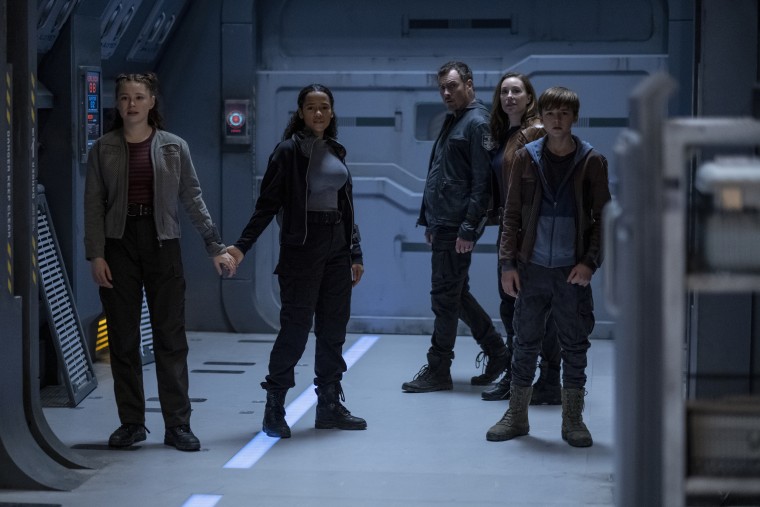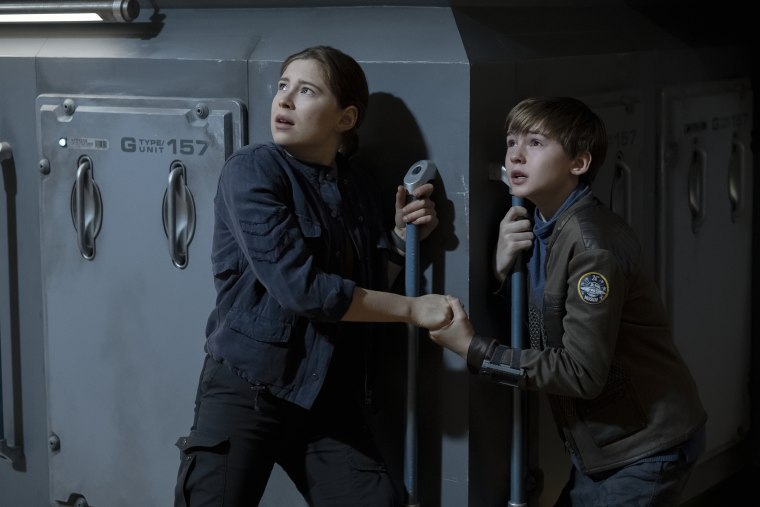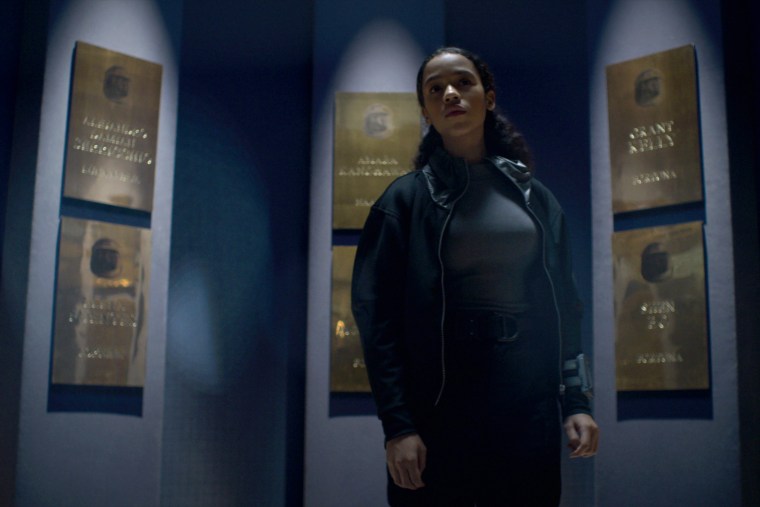Remaking a classic TV show is a risky gambit. One can attract new followers but also incense fans of the original property. “Lost in Space,” the ’60s science fiction series known for balancing interstellar adventures with camp humor, has always been tricky to rework. A 1998 feature film was a dismal flop, and a TV pilot for the 2004 reboot “The Robinsons: Lost In Space” never aired. However, Netflix has managed to succeed with a “Lost In Space” revamping by expanding upon its original premise while updating its cast makeup to reflect modern times.
The key to the new series are the lead female roles. They are far more involved and proactive than in the original show, which went off the air a little over 50 years ago. Mankind is still venturing to the star Alpha Centauri to escape an overpopulated, environmentally exhausted Earth, but this time en masse rather than just the spaceship Jupiter 2 manned by the Robinson family being the first and sole exploration party.
The second season, which came to Netflix Tuesday, starts with the Robinson family now truly lost in space, far away from their fellow colonists' fleet and stranded on a planet without oxygen, without any idea where they are and unable to recharge the ship’s battery system to take off.
Right away we see how the women play critical roles far more proactive and central than in the original show. While former U.S. Navy SEAL John Robinson is still the patriarch and young son Will ever the adventurer and science whiz, the women share equal scientific and technical responsibilities, rather than the domestic chores that had been their preoccupation.
A clan with equal gender involvement, not to mention its imperfections and conflicts, feels a lot more like a modern American family. It's all a step forward in realistic storytelling within a far-out context.
No longer is Maureen Robinson the nurturing domestic matriarch disguised as a biochemist; she is now a brilliant aerospace engineer with personal motivations beyond family caretaking. Aged slightly down, her daughters Judy and Penny Robinson (a medical doctor and mechanic, respectively) are not there simply to keep house; they are involved in the mission, with Penny occasionally showing reckless abandon when trouble arises.
And the self-centered survivalist Dr. Smith, originally a sneaky saboteur who got trapped aboard the ship before takeoff and played with comic glee by Jonathan Harris, finds a darker variation through Parker Posey’s devious and nuanced portrayal of an identity-stealing sociopath.
Upgrading the gender roles does not just serve to modernize them. Good, bad and shades of gray are represented by both genders here, making for a more multifaceted production. Moreover, the Robinsons act as a true family unit where they can all rely on one another — their greatest strength and asset.
Predictably, some cranks have griped that a show with stronger women and a more multicultural supporting cast is the result of feminism, political correctness and social justice warriors pushing a liberal agenda. But the reality is that the idealized (and white) nuclear family of 1965 no longer exists, if it ever did in its TV form.
In fairness, the first season of the original was serious sci-fi with a likable cast, and a young John Williams’ score remains iconic. The next two seasons in color varied in quality, but they are understandably endearing for many boomers and Gen Xers.
But a clan with equal gender involvement, not to mention its imperfections and conflicts, feels a lot more like a modern American family. It's all a step forward in realistic storytelling within a far-out context.

As Mina Sundwall, who portrays Penny, noted in an interview with Syfy Wire last year, the show doesn’t make a big deal about having a female scientist and doctor. Gender is not portrayed as being controversial. She is not stifled by any preordained boundaries.
Back in the first version, Penny was meeker. But now the middle Robinson child is a trained mechanic and not prone to always obeying her parents. She takes chances that her brother would have in the original. Like, when her parents are caught out in a deadly storm, she takes their SUV to rescue them even though she barely knows how to drive it.
“She's trying to become more independent whilst never really having fit in this family of overachievers and still being treated like a kid,” Sundwall told me at New York Comic Con this fall.
The second season provides an opportunity to dig more into these women’s motivations and back stories, noted Molly Parker, who plays Maureen Robinson.
“One of the things that gets explored in the second season is the reason she brought the family out here. It's not because Earth is a place we don't want to be,” she told me. “She has grown up believing that it is her destiny to go into space, and so she has created a situation to fulfill that wish, even though it puts the lives of her family at risk.”

As Parker pointed out, that’s risk with a capital R: “So much of the show for me is about putting the children into situations where they almost die all the time.”
Exploring that dynamic, she explained, means her character “is becoming slightly more complicated than just the science mother bear.”
The darker tone has also been key to the success of the Netflix incarnation, and it gets ramped up as the Robinson family faces the prospect of permanent separation from the fleet at the start of Season 2. Viewers get to experience the wonder of space while also acknowledging the natural trepidation of exploring alien territory — as well as the internal group conflicts that arise when facing such fear.
For instance, there were times in the original series when a viewer would have to wonder why the Robinson Family didn’t just jettison the insufferable Dr. Smith into space. He would be immediately voted off of “Survivor: Mars.” (That said, his famed, alliterative insults towards the Robot, like “you bumbling bucket of bolts,” were funny.)
Posey’s Dr. Smith, in contrast, is just as vexing but slicker and more insidious, haunted by images of her troubled past, conning her way into space and being envious of the Robinsons’ unity.
Posey views classic theatrical villains as broken, expressive people who audiences want to both pity and fear, and this conception informs her richer portrayal. “They're aware of their destructiveness, but they're somehow positive in that they are getting what they want through other people,” she told me. “What's fun about her [Smith] is you know she’s siphoning this energy at times from other people. But she is aware of it and playing with it. That’s what makes it more family TV than just something evil.”
The darker tone has also been key to the success of the Netflix incarnation, and it gets ramped up as the Robinson family faces the prospect of permanent separation from the fleet at the start of Season 2.
Similarly, the most level-headed of the Robinson kids, oldest daughter Judy (Taylor Russell), has a lot going on beneath the surface, albeit for different reasons. A trained medical engineer, she is the biracial daughter from Maureen’s first marriage. She has post-traumatic stress disorder from nearly freezing to death while trapped in ice in the very first episode, and she has a rocky relationship with her stepfather John.
“I like that, within the awkwardness of their relationship, how disconnected they are,” Russell said. “They have moments where they hug and can say, ‘I love you.’ And also be extremely complicated and have a huge barrier up. That’s like a real family, right?”
This Robinson clan may be different than the original, but their spirit remains strong. It might not have the comedic factor that endeared some people to the alpha version, but for those who appreciate the more serious sci-fi tone, it's a large step forward without disrespecting the original trajectory of the series.
After all, if science fiction is supposed to show us the possible future of progress that awaits us, doesn’t it need to be progressive?



